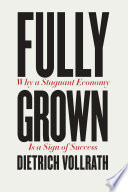I feel like the book doesn‘t hit a sweet spot. It‘s too dumbed down to be a good read by people who are well-versed in economics but too technical for more general readers. I‘m someone who lives numbers and statistics but not too familiar with macroeconomic terms. I loved and agreed with his arguments but his repetition and sometimes overly-technical analysis made me wish this book was 100 pages shorter. And it was only 216 pages.
1 like


















